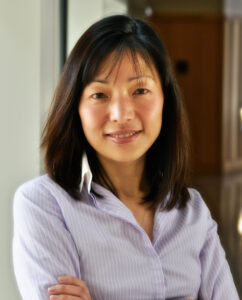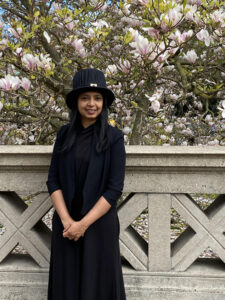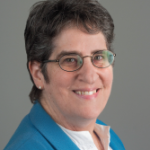Akiko Iwasaki, PhD, Receives the 2022 Lupus Insight Prize

In June 2022, the Lupus Research Alliance (LRA) awarded its Lupus Insight Prize to Akiko Iwasaki, PhD, for her discovery of the link between endogenous retroviruses and systemic lupus erythematosus (SLE). Dr. Iwasaki, who is a Sterling Professor of Immunobiology and a professor of dermatology, epidemiology, and molecular, cellular and developmental biology at Yale University, has also been a principal investigator at the Howard Hughes Medical Institute (HHMI) since 2013. She was elected a member of the HHMI Council in 2021.
Dr. Iwasaki’s main focus has been on the mechanisms of immune defense against viruses at the mucosal surfaces and the development of mucosal vaccine strategies; her turn to lupus research has been more recent. Her seminal discovery, for which she received the LRA prize, demonstrated that endogenous retroviruses generate B cells that produce immune proteins targeting the body’s own tissues. She and her team also found that endogenous retroviruses impel neutrophils to release spiderweb-like structures known as NETS, which promote inflammation in SLE.
During the pandemic, Dr. Iwasaki and her team began delving into the relationship between autoimmunity and long COVID, and she is currently the co-lead investigator of the Yale LISTEN study, with Harlan Krumholz, MD, SM, the Harold H. Hines Jr., professor of medicine (cardiology) and professor of investigative medicine and public health at Yale.
Dr. Iwasaki received her PhD from the University of Toronto and her postdoctoral training from the National Institutes of Health. Her first focus in the sciences was physics and math, but during an introductory immunology course her senior year in college, “I fell in love with immunology,” she says.
“What attracts me is that it is this beautiful system—it’s like an orchestra inside of your body and every cell is equipped with different tools and they have to ‘make the music’ in a way that makes sense to fight against infection,” she says. But when that system goes awry, it creates discordance, if you will, that informs the core of Dr. Iwasaki’s work.
In recognition of her wide-ranging research—probing the mechanisms of protection provided by memory T cells within the mucosal organs; the effects of temperature on the innate immune responses to viruses; and adaptive immunity to viruses among other explorations—she has garnered multiple appointments and awards. She was elected to the National Academy of Sciences in 2018, to the National Academy of Medicine in 2019, and to the European Molecular Biology Organization in 2021.
A staunch champion of women in the sciences, Dr. Iwasaki also believes now is the time to direct more research toward such diseases as lupus and chronic fatigue syndrome, which predominantly affect women. “This is an opportunity for us to get into that [research] with rigor,” she says.
Tuhina Neogi, MD, PhD, Honored by OARSI & Lund University
 In April 2022, Tuhina Neogi, MD, PhD, the Alan S. Cohen Professor of Rheumatology and Chief of the Division of Rheumatology at Boston University, traveled to Berlin for the World Congress of the Osteoarthritis Research Society International (OARSI) to receive the organization’s 2022 Clinical Research Award. Dr. Neogi has devoted the majority of her research efforts over the past 15 years to osteoarthritis and gout, with more than 300 publications.
In April 2022, Tuhina Neogi, MD, PhD, the Alan S. Cohen Professor of Rheumatology and Chief of the Division of Rheumatology at Boston University, traveled to Berlin for the World Congress of the Osteoarthritis Research Society International (OARSI) to receive the organization’s 2022 Clinical Research Award. Dr. Neogi has devoted the majority of her research efforts over the past 15 years to osteoarthritis and gout, with more than 300 publications.
“To be recognized by an international society for my body of work being important is a high honor,” she says.
She first started attending the OARSI World Congress in 2006, and subsequently became involved with various committees and the OARSI Board, and currently serves as deputy editor for the society’s journal, Osteoarthritis & Cartilage. Her first study on pain in osteoarthritis (OA) was recognized by OARSI at its 2009 annual meeting as a leading clinical research paper of the year. An OARSI Young Investigator Award followed in 2011. The 2022 award places Dr. Neogi among a group of preeminent international osteoarthritis researchers, and one of the youngest researchers to have received it.
After the OARSI World Congress, Dr. Neogi went to Lund University, Sweden, to join an esteemed group of scientists and academics who were receiving honorary doctorates from the university. The honorary doctorate was given in recognition of Dr. Neogi’s 10-plus years of collaborations with researchers at the Lund University Faculty of Medicine, and of her significant contributions to, and support of, clinical research in rheumatic and musculoskeletal diseases. The centuries-old ceremony, dating from the 1600s, was full of pomp and circumstance and included Dr. Neogi wearing a special hat and ring, and cannons being fired as degrees were conferred.
Dr. Neogi chuckles as she recalls that at the Lund University festivities, with her mother as a guest, some attendees approached her mother, assuming because she was the older woman, the award was being bestowed on her, not on Dr. Neogi.
Dr. Neogi was humbled, she says, to find herself among so many other recipients—astrophysicists, economists, architectural thinkers—who were all deserving of such high recognition. Dr. Neogi is not only grateful for the honor, but also that she was able to share the special occasion with her mother; it was their last trip together before her mother passed away following an unexpected illness.
Meanwhile, Dr. Neogi’s work continues apace, as she leads large and longitudinal studies of knee OA, mentors many early stage researchers, and rigorously pursues diversity and inclusion on the Boston University medical campus.
Kimberly Trotter, MD, Receives National Medical Association Emerging Leader Award
 At the annual meeting of the National Medical Association (NMA), held July 30-Aug. 3, 2022, in Atlanta, Kimberly Trotter, MD, assistant professor of medicine in the Section of Rheumatology at The University of Chicago, received the Emerging Leader Award.
At the annual meeting of the National Medical Association (NMA), held July 30-Aug. 3, 2022, in Atlanta, Kimberly Trotter, MD, assistant professor of medicine in the Section of Rheumatology at The University of Chicago, received the Emerging Leader Award.
“I was really honored to receive this award,” she says. She was also appreciative that, by honoring her and her work with lupus, the NMA is bringing more focus to the disease.
Dr. Trotter is the co-director of the Lupus Clinic at the University of Chicago and is involved in several ongoing clinical trials. She is committed to helping change the landscape of clinical trials by increasing the participation of people of color in underserved communities. Many African Americans, who are disproportionately affected by lupus, are often hesitant to join clinical trials due to the historical trauma their communities have experienced.
To address this hesitancy, Dr. Trotter has embarked upon an intentional community outreach program, giving lectures to community groups and participating in radio spots. There can be a lag between development of lupus symptoms and actual diagnosis, she noted, so her talks—especially to Black women in whom lupus is more prevalent—focus on the signs and symptoms of the disease.
“These extra community engagements help patients feel that they are supported and getting the information they need about the disease process,” she says.
Dr. Trotter also worked with the ACR Lupus Clinical Trials Training (LuCTT) program to address the racial and ethnic disparities in clinical trial enrollment.
In the clinic with her own patients, Dr. Trotter spends initial visits establishing trust. Now eight years out of fellowship training, she recalls that she had not expected to feel a “pull toward rheumatology” during medical school at the University of Maryland School of Medicine. And during a rheumatology rotation, she found herself drawn to the diverse patient population and to the disease processes that encompass many different systems.
“One of the nice things about rheumatology is that we have the opportunity to form lasting physician-patient relationships and to form close bonds,” she says.
Gretchen Henkel is a health and medical journalist based in California.



